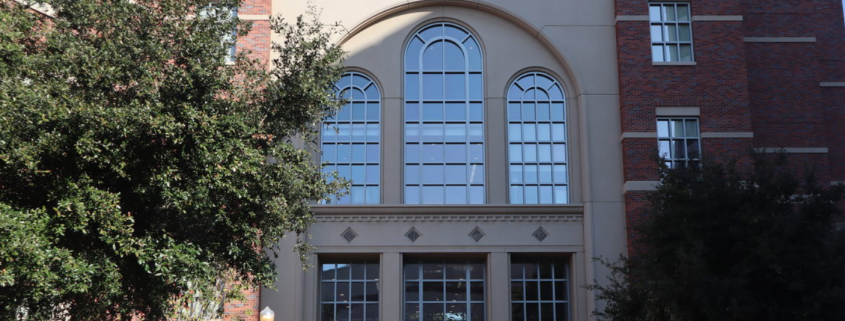USC reaches $852 million settlement with Tyndall abuse survivors
USC will pay $852 million to more than 700 patients of former campus gynecologist George Tyndall after reaching a settlement Thursday, making it the largest sexual abuse settlement in history against any university. The development follows a $215 million class action lawsuit approved in February 2020 that allowed the University to provide payouts ranging from $2,500 to $250,000 to former patients who chose to come forward.
“Our abuse has been recognized at a higher level,” said Daniella Mohazab, a patient of Tyndall’s from 2016, who spoke at a press conference hosted by attorney Gloria Allred Thursday. “We are seen. We’ve been heard. Now, we can continue to heal, focus on ourselves.”
The majority of the 710 women will receive an average of $1.2 million from the settlement, attorney John Manly, who represents 234 of the individuals, said at a press conference he hosted Thursday. A retired judge, who specializes in redistribution, will allocate the funds.
“I’m sure when you arrived at USC … and you go to orientation, they talk about how you’re a member of the Trojan family,” Manly told the Daily Trojan. “If these women that I represent … are part of the Trojan family, they’re our daughters, our sisters and our moms, right? We don’t treat family that way.”
Former patients of Tyndall largely began stepping forward in May 2018, following a Los Angeles Times investigation that exposed Tyndall’s history of sexual misconduct over his nearly 30-year tenure that was kept under wraps by a quiet firing in 2016 following an internal investigation.
“While I don’t feel there’s a way to really put monetary value on the pain and suffering endured from being physically abused, and then silently and even subconsciously living out the consequences of the abuse for over 20 years, this day is a starting place for me,” Kathryn, a former patient of Tyndall’s victims whose last name was omitted, said at the press conference hosted by Allred Thursday.
Despite the developments within the settlements, Tyndall’s attorney Leonard Levine said Tyndall remains adamant of his innocence.
“Dr. Tyndall continues to maintain that he is innocent of all criminal charges in this case and he looks forward to a jury trial when the charges will be tested for the first time in a court of law,” Levine said.
The Board of Trustees hired law firm O’Melveny & Myers to conduct an independent investigation into Tyndall’s misconduct in May 2018, following Rick Caruso’s election as chairman that same month. Caruso initially said he would release the results of the investigation following litigation; however, at a student briefing Thursday Caruso said there are no plans to release the report now that the settlement has been finalized, saying that it would only cause more pain to former patients of Tyndall.
“There’s no upside to any release,” Caruso said during a student media briefing Thursday. “There was not a formal report that was created. There was a presentation that special counsel gave to the executive committee and the board. At this point, given where this case is at, we feel strongly that having anything released, is only going to cause more pain and suffering to the victim. And it’s in the best interest of the victims to just let this get settled and move forward.”
Manly called out Caruso’s decision to withhold the results of the investigation during his press conference, requesting that USC be transparent for the benefit of the public.
Since the investigation, USC has expanded safety protocols to include a rewritten sensitive exam policy in accordance with the American College Health Association’s best practices, employing more women board-certified physicians, increased accessibility to reporting potential misconduct and patient feedback and the expansion of the Relationship and Sexual Violence Prevention program.
The University has also established a Division of Human Resources, Equity, and Compliance, a centralized Office for Equity, Equal Opportunity, and Title IX, a Universitywide Prohibited Discrimination, Harassment and Retaliation policy for students, staff and faculty as well as extended support for mandatory training and 24/7 victim advocacy services.
“As we work to restore trust and rebuild our community, our guiding principle must always be to
foster an environment where all students, faculty, and staff feel welcome and safe,” Caruso wrote in a letter to the University community. “While we have much work to do, I am proud of the progress we have made since the difficult summer of 2018 and have great optimism for the future of our university.”
USC will fund the settlement over the next two fiscal years by drawing from litigation reserves and insurance proceeds, deferring capital spending and managing non-essential expenses and assets, according to a letter from President Carol Folt to the University community. None of the funds will come from philanthropic gifts, endowment funds or tuition, she wrote. The University will also put together an advisory committee comprising faculty, staff and students, which will aid school deans and the Academic Senate on Finance and Enrollment in providing input on the budget.
“The amount is significant, and we will face some difficult financial choices in the near term.
However, we have a strong balance sheet and resources to support our academic priorities,” Folt wrote.
Manly said although there’s work to be done to “restore the University,” he said he’s hopeful that the culture at USC will change under Folt’s leadership.
“I’m very hopeful that President Folt is going to change the culture, and the culture needs to change,” Manly said. “But if it doesn’t, you’re going to have hundreds of women who are going to watch and wait and see what happens … They’re going to hold her accountable.”
Ana Mata and Kacie Yamamoto contributed to this report.
This article was updated at 7:30 p.m. to include quotes from press conferences held by law firms and survivors after the announcement of the settlement.

